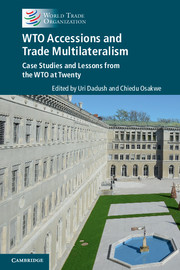Book contents
- Frontmatter
- Dedication
- Contents
- List of contributors
- Foreword
- Acknowledgements
- List of abbreviations
- Editors' note
- PART I WTO accessions, the trading system and the global economy
- PART II Overview: systemic outcomes from accessions
- PART III Members’ perspectives on accession negotiations
- Original members
- Article XII members
- 16 The 2001 WTO accession of China: negotiating experience – challenges, opportunities and post-accession approaches
- 17 The 2001 WTO accession of the Separate Customs Territory of Taiwan, Penghu, Kinmen and Matsu: negotiating experience – challenges, opportunities and approaches post-accession
- 18 The 2004 WTO accession of Cambodia: negotiating priorities and experience – growth and integration eleven years later
- 19 The 2008 WTO accession of Ukraine: negotiating experience – challenges, opportunities and post-accession approaches
- 20 The year 2012: WTO accession of Montenegro – why did we apply to join? Priorities and results
- 21 The 2012 WTO accession of Russia: negotiating experience – challenges, opportunities and post-accession approaches
- 22 The 2013 WTO accession of Lao PDR: specific commitments and the integration of least-developed countries into the global economy
- 23 The 2013 WTO accession of Tajikistan: experience of a landlocked economy in a changing regional economic configuration
- 24 The 2014 WTO accession of Yemen: accession negotiations as an instrument for domestic reform, national security and international cooperation
- PART IV Working party chairpersons’ perspectives on accession negotiations
- PART V Salient features inWTOAccession Protocols
- PART VI Conclusion
- Annex: Contributor biographies
- Index
- Plate section
17 - The 2001 WTO accession of the Separate Customs Territory of Taiwan, Penghu, Kinmen and Matsu: negotiating experience – challenges, opportunities and approaches post-accession
from Article XII members
Published online by Cambridge University Press: 05 November 2015
- Frontmatter
- Dedication
- Contents
- List of contributors
- Foreword
- Acknowledgements
- List of abbreviations
- Editors' note
- PART I WTO accessions, the trading system and the global economy
- PART II Overview: systemic outcomes from accessions
- PART III Members’ perspectives on accession negotiations
- Original members
- Article XII members
- 16 The 2001 WTO accession of China: negotiating experience – challenges, opportunities and post-accession approaches
- 17 The 2001 WTO accession of the Separate Customs Territory of Taiwan, Penghu, Kinmen and Matsu: negotiating experience – challenges, opportunities and approaches post-accession
- 18 The 2004 WTO accession of Cambodia: negotiating priorities and experience – growth and integration eleven years later
- 19 The 2008 WTO accession of Ukraine: negotiating experience – challenges, opportunities and post-accession approaches
- 20 The year 2012: WTO accession of Montenegro – why did we apply to join? Priorities and results
- 21 The 2012 WTO accession of Russia: negotiating experience – challenges, opportunities and post-accession approaches
- 22 The 2013 WTO accession of Lao PDR: specific commitments and the integration of least-developed countries into the global economy
- 23 The 2013 WTO accession of Tajikistan: experience of a landlocked economy in a changing regional economic configuration
- 24 The 2014 WTO accession of Yemen: accession negotiations as an instrument for domestic reform, national security and international cooperation
- PART IV Working party chairpersons’ perspectives on accession negotiations
- PART V Salient features inWTOAccession Protocols
- PART VI Conclusion
- Annex: Contributor biographies
- Index
- Plate section
Summary
ABSTRACT
The economy of Chinese Taipei has always been highly dependent on trade. Nevertheless, its WTO accession negotiations were demanding – although the results have been significant and beneficial – involving a total of eleven formal meetings and five informal meetings for the working party, and approximately 200 bilateral meetings between Chinese Taipei and thirty different WTO members. The gradual opening of Chinese Taipei's market exposed domestic industries to global competition, necessitating a process of adjustment and adaptation that has ultimately led to economic growth. For the more vulnerable industries, the challenges of market liberalisation have acted as an incentive to restructure and reinvent in order to improve competitiveness. Chinese Taipei's accession to the WTO has also been a catalyst for the globalisation and development of these industries and necessitated a process of adjustment and adaptation that has ultimately led to economic growth. The trade policies and regulations of Chinese Taipei underwent a thorough review and revision as a result of the requirements of WTO membership, and this legislative overhaul has been highly beneficial in modernising the trade regime.
The economy of the Separate Customs Territory of Taiwan, Penghu, Kinmen and Matsu (Chinese Taipei) has always been highly dependent on trade. During the 1970s and 1980s, Chinese Taipei was developing at a remarkable pace, with exports being the engine of its economic growth. These years of unprecedented growth have made it the twentieth largest exporter and the eighteenth largest importer of goods in the world today. In the services sector, Chinese Taipei is now the world's twenty-sixth largest exporter and the thirtieth largest importer. These achievements were not easy to accomplish. Before Chinese Taipei's accession to the WTO in January 2002, its export products were frequently subjected by its major trading partners to discriminatory trade measures, often in the form of quantitative import restrictions, the elimination of the Generalised System of Preferences (GSP) treatment and anti-dumping investigations. Whenever such trade disputes occurred, Chinese Taipei lacked the effective channels to resolve them. They were the kind of trade barriers to Chinese Taipei's products that would be considered today to constitute unfair treatment and to seriously diminish Chinese Taipei's economic interests.
The Tokyo Round of the General Agreement on Tariffs and Trade (GATT) negotiations from 1973 to 1979 proceeded smoothly, reducing tariffs on goods and eliminating non-tariff barriers (NTBs) between the participants.
- Type
- Chapter
- Information
- WTO Accessions and Trade MultilateralismCase Studies and Lessons from the WTO at Twenty, pp. 448 - 463Publisher: Cambridge University PressPrint publication year: 2015

